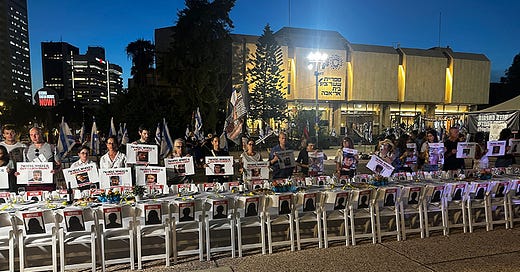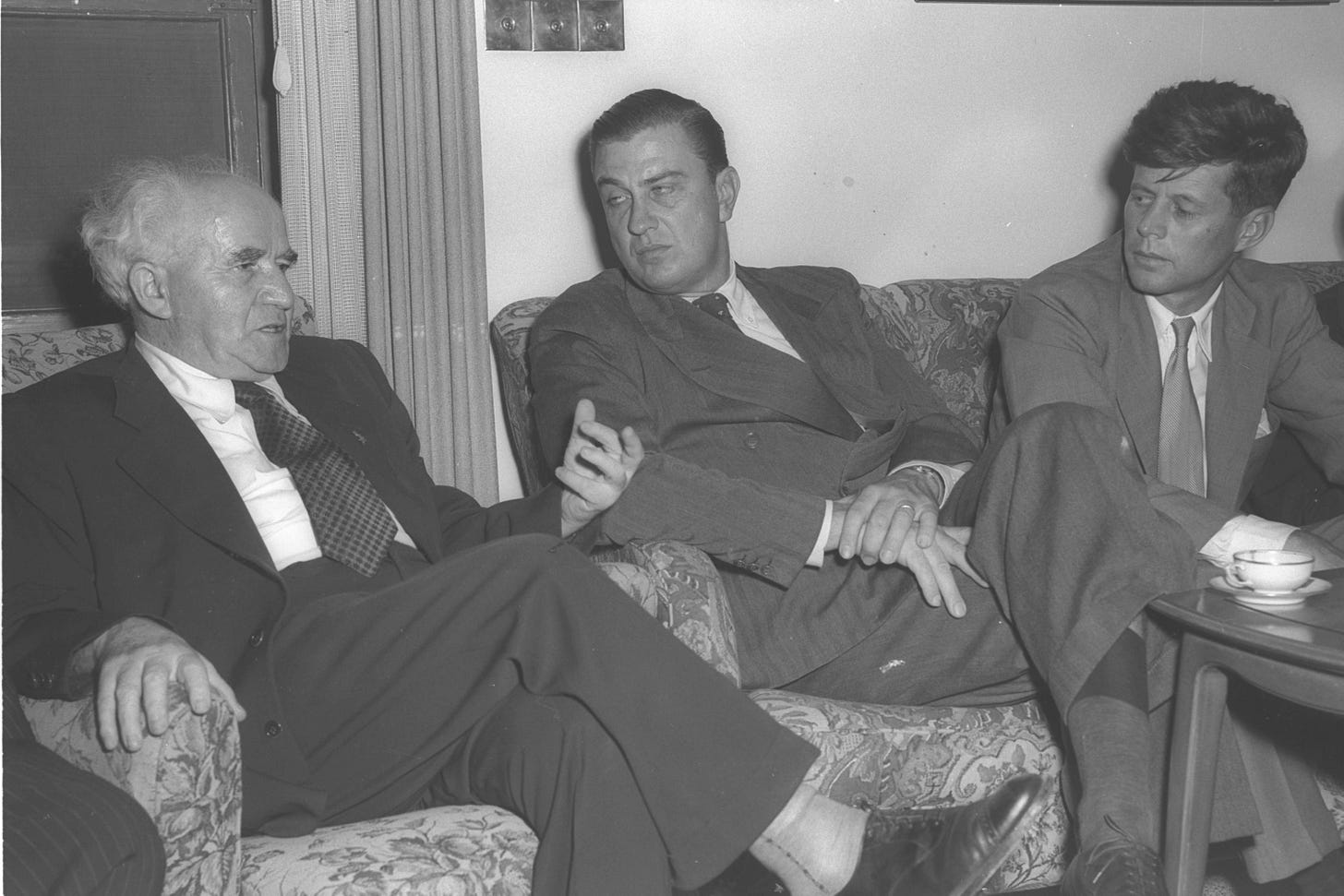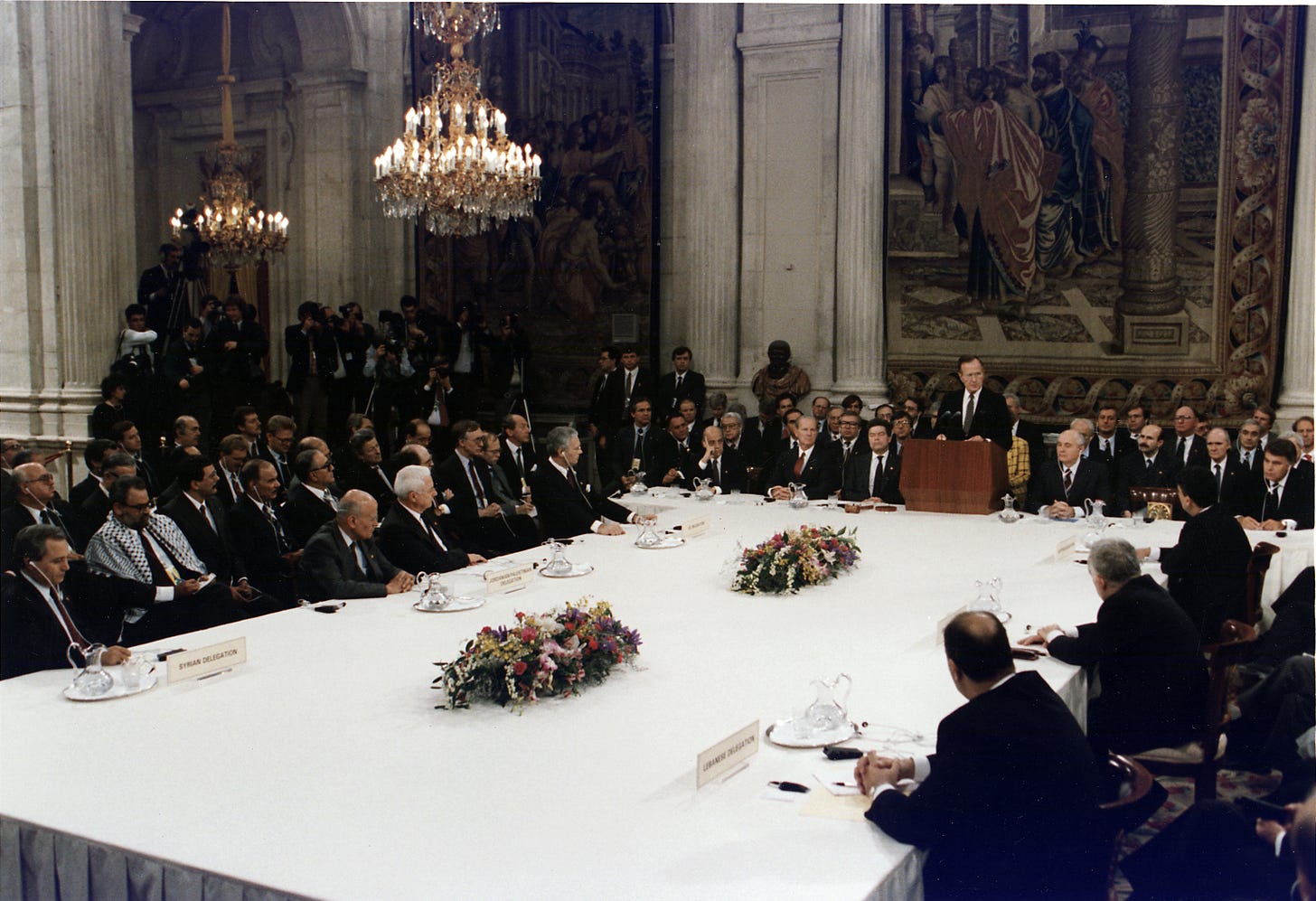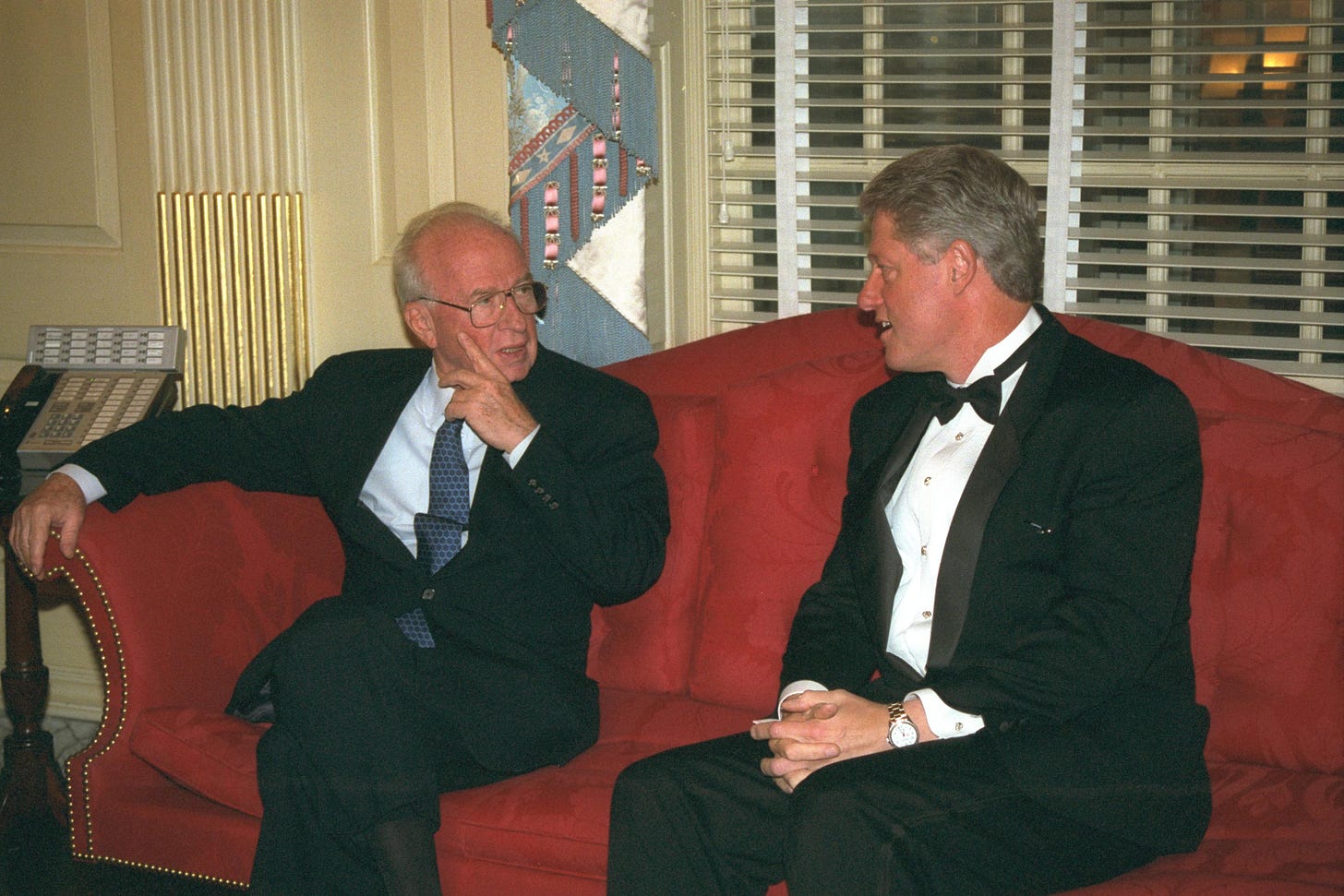DAY 20 OF THE GAZA WAR: Waiting For a Hostage Deal, A History of US Israel Relations
Tel Aviv Diary October 26, 2023
I will have a Zoom meeting with subscribers Sunday at 6PM Israel time 11 AM Eastern time. An email invite will go out Sunday morning . I look forward to speaking with many of you then!
I woke up this morning to the news that Israeli troops had entered Gaza. Briefly, I thought the ground attack had begun, but the mobilization was revealed to be merely a large raid. A force of tanks and combat engineers, along with part of the Givati Brigade, advanced about one mile into Gaza. Their primary aim was to prepare the way for larger forces and to gather intelligence.
So, day 20 of the war was very much like the last few days … a day of waiting. What have we been waiting for? One report suggests that after Prime Minister Netanyahu had two meetings with Major-General (Res.) Itzhak Brik (who has often played the role of a Cassandra, warning of the IDF's unpreparedness), Netanyahu may have accepted Brik’s view that the army isn't ready to mount the ground incursion. Brik believes Israel should wait a month to fully enter Gaza, at which point Hamas will be exhausted and deprived. Retired Major-General Brik has been frequenting TV studios, repeatedly and adamantly asserting the army's lack of readiness. Many people I trust disagree with Brik’s views and believe both that the army is indeed ready and that now is the time to attack. However, Netanyahu is exceedingly cautious and is decidedly known for delaying decisions — and Major-General Brik has given him an excuse.
Another potential reason for the delay of the charge into Gaza — and at this juncture a more plausible reason — is the strategic move made by Hamas to release four hostages, which has lead to expectations of a potential large-scale hostage negotiation. Today, the Foreign Minister of Qatar stated that progress was underway regarding a partial hostage release, but the crux of any deal hinges on a complete ceasefire. In other words, an armistice must be established before any negotiation can proceed—a condition Israel cannot accept. The pressing question is whether Qatar and Hamas are merely buying time. With such significant leverage, Hamas lacks the incentive to compromise.
In the meantime, Israel continues its bombardment of Gaza, systematically targeting many of the Hamas leadership.
Earlier tonight, I attended a rally held by the relatives of the hostages. The experience was purely heartbreaking. It's profoundly evident that the government's communication and engagement with the families of the kidnapped have been sorely inadequate.
This seems to be in line with this government's typical conduct. Beyond the harrowing tales of individual hostages, the collective plea to bring all the hostages home was unequivocal. Their chants shook the plaza demanding an immediate return of all their loved ones.
I fervently wish someone had the power to bring them all back today, but regrettably, this outcome remains elusive.
How long can Israel hold off its Gaza ground offensive? Nearly three weeks have elapsed since the war erupted. If no agreement to return the kidnapped hostages has been brokered thus far, is a deal even attainable? The dilemma lies in weighing the significance of the hostages' return against the government’s stated primary goal of eliminating Hamas. These two goals are seemingly contradictory. As each day passes, the calls from the world for Israel to consent to a ceasefire grow louder. Time is slipping away, challenging the initial perception here that after enduring such a brutal massacre, the world would afford Israel the time it needed to respond as it saw fit. Every life is invaluable, but without addressing the existential threat posed by Hamas, our fundamentalist, terrorist neighbors, the security of Israel's future remains in jeopardy.
In contrast to previous days, today was relatively quiet around Israel’s Gaza border. Tel Aviv encountered three rocket barrages, but all were effectively intercepted. Both Ashdod and Ashkelon faced similar rocket threats, with identical outcomes — although part of one of the missile interceptors fell on an electric line, causing a small fire, and halting electric service to parts of Rehovot.
The North was particularly quiet today. There was an attempt to fire an anti-tank missile at an Israeli border installation, but the Hezbollah squad that attempted to carry out that attack was eliminated from the air.
Defense Minister Galant held a press conference tonight and responded to questions. He did not shed any new light on the situation, nor did he explain the delay in the ground operation. In his comments regarding Hamas, Galant passionately asserted, “It's either us or them." Galant further added, “An event like this has not occurred in the 75-year history of the State; our response will shape the next 75 years of our history.”
A myriad of fateful, decades-long misconceptions have been revealed these past few weeks. Another misconception of the Israeli government became evident in the last 24 hours — the attempt to maintain cordial relations with Russia, as a result of holding back on assistance to Ukraine. Last night at the UN, the Russians vetoed the American resolution condemning the Hamas attack. Today, Moscow welcomed a Hamas delegation. No words.
•••∞•••
A HISTORY OF US-ISRAEL RELATIONS
The current war is the apex of the relationship between the United States and Israel. That relationship has always been complex and includes the relationship between American Jewry and Israel, which I will write about at a later date. This is not a comprehensive accounting of the relationship, but an outline of the major moments.
Before the establishment of the state …
One of the most important moments in the relationship took place before the establishment of the state. This was the decision of the US to support the establishment of the state. The famous story revolves around President Truman’s former partner in a clothing store, Eddie Jacobson, who convinced Truman to meet Chaim Weizmann. Weizmann was able to persuade Truman, despite the opposition of the State Department, to support the UN Partition Plan. The US actively supported the Partition Plan, convincing other countries to do the same.
In the hours leading up to the declaration of Israel’s independence, the US State Department was working on a plan to delay that fateful notification. However, minutes after Israel declared its independence, Truman ordered the State Department to recognize the State of Israel. Although the US was the first country to recognize the new Jewish state, Israel was on its own in terms of arms. As both the US and Great Britain both promptly announced an arms embargo on Israel.
1951-1953: During this period, as American Jews started to buy Israeli bonds, the US government began to give economic aid to Israel.
1956: This year was one of the low points in US-Israel relations. After Israel, in conjunction with France and Britain, attacked Egypt, President Eisenhower was furious at all the parties involved and eventually pressured Israel to agree to a full withdrawal. The events of 1956 caused members of American Jewry to form AIPAC, the American Israel Public Affairs Committee.
1962: While the US had secretly agreed to allow West Germany to sell US-made arms to Israel, the first public sale of US arms to Israel was made by President Kennedy, who agreed to sell Hawk anti-aircraft missiles to Israel.
1966: President Johnson agreed to the sale of US aircraft, Skyhawks (subsonic tactical bombers), for the first time. The planes arrived after the Six-Day War.
1967: During the period leading up to the Six-Day-War, the US tried to avoid the conflict and organized a maritime fleet to break the Egyptian blockade of the Red Sea. When that effort failed, the US gave its tacit approval for Israel to begin the war. In light of Israel's overwhelming victory in the war, the US attitude toward Israel began to change. It began to see Israel as a potential ally, and not just as a poor country needing protection. Military cooperation started between the IDF and the US military after this time.
1968: When the War of Attrition broke out, the US agreed to sell the F-4 Phantom to Israel, the mainstay of the US Air Force at the time. During the war, Israel supplied the US with essential information on the capabilities of the Soviet equipment that the Egyptians used.
1973: In the hours leading up to the Yom Kippur War, the US asked Israel not to launch a preemptive attack. Israel requested the US to resupply key equipment. Initially, El Al planes were allowed to pick up equipment from the US, but that proved insufficient. President Nixon ordered a massive airlift of US arms to Israel.
Post-1973: In the immediate aftermath of the Yom Kippur war, US Secretary of State Henry Kissinger was actively involved in reaching interim agreements between Egypt, Syria, and Israel.
1974: After the war, President Nixon became the first US President to visit Israel.
1977: Israel received the first of the latest US combat aircraft, the F-16.
1978: Following Egyptian President Anwar Sadat’s visit to Israel, President Jimmy Carter hosted Israeli Prime Minister Begin and Sadat at Camp David. There, the leaders worked to reach a peace agreement between Israel and Egypt. After the agreement was signed, the US increased aid to Israel to help finance its withdrawal from Sinai.
1980s: The US was active in Israeli defense policy and persuaded Israel to stop producing the LAVI fighter jet.
1985: Israel and the US sign a Free Trade Agreement.
1991: The US deploys Patriot missiles to Israel, to protect Israel from Iraqi Scuds.
1991: The US brokers the Madrid Conference, which was the first peace conference that included Israel and the Palestinians in the same room.
1993: The Oslo Accords between Israel and the PLO are signed, during a ceremony which took place at the White House.
2000: US President Bill Clinton hosts the Camp David Summit, with Ehud Barak and Yasser Arafat. The summit ends in failure, when Arafat rejects Barak's proposal without offering a counterproposal
.
2007: The US and Israel agree on a 10-year military assistance deal, which is later extended for another 10 years by President Obama.
2015: US President Barack Obama signs the Iran nuclear deal.
2017: US President Donald Trump recognizes Jerusalem as Israel's capital.
2018: The US Embassy opens in Jerusalem.
2020: The US brokers the Abraham Accords.
2023: After the Hamas Attack on Southern Israel, the US sends a carrier battlegroup to the Eastern Mediterranean. The US initiates an airlift of additional arms to Israel, and President Biden visits Israel during the war. President Biden also proposes a $14 billion arms package to Congress.
The next Tel Aviv Diary will go out on Saturday Night








